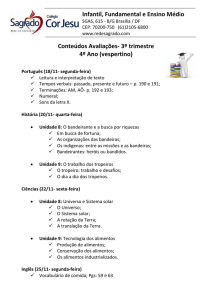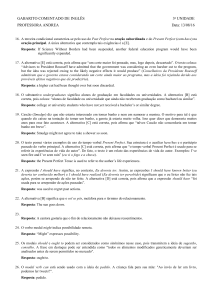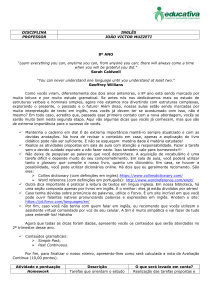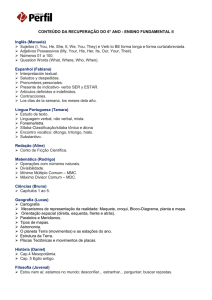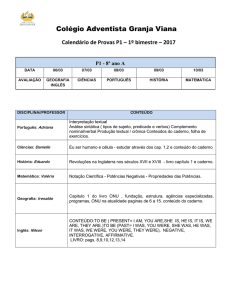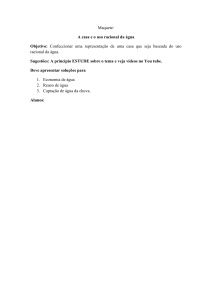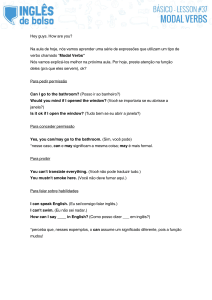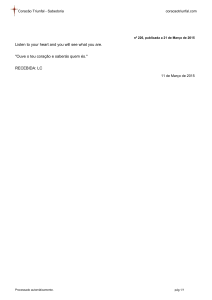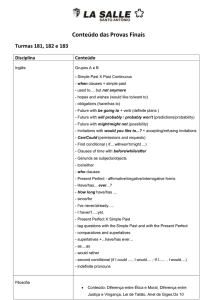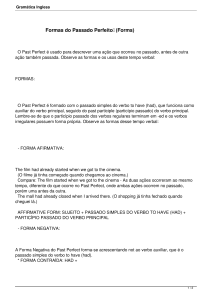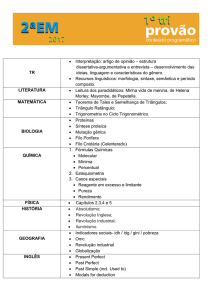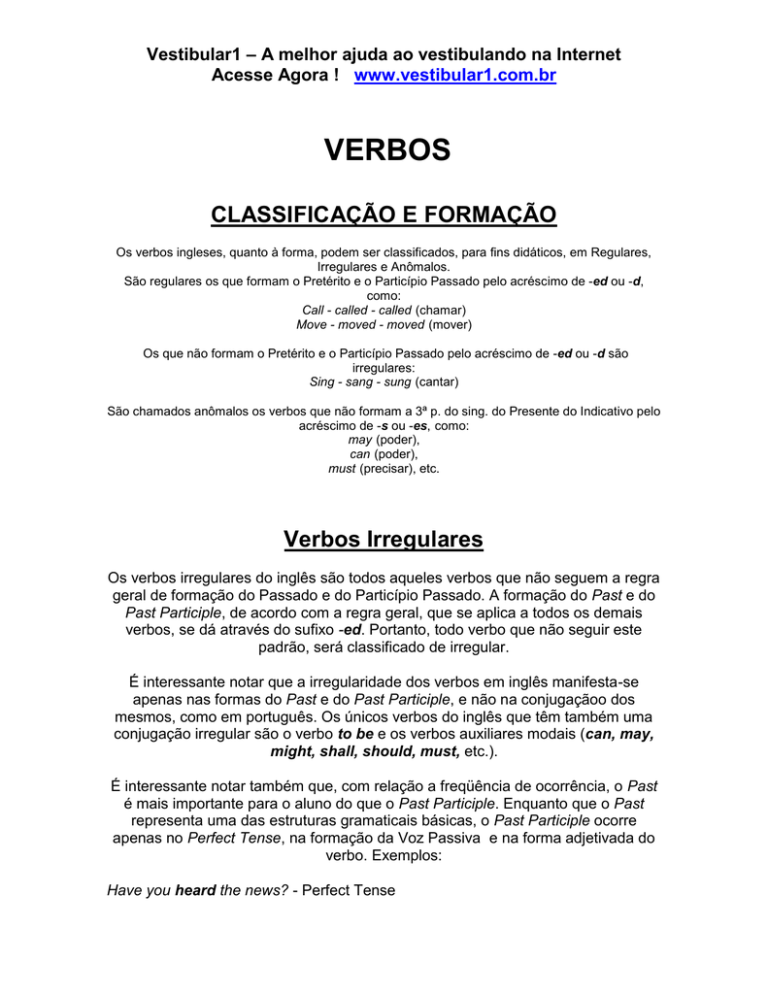
Vestibular1 – A melhor ajuda ao vestibulando na Internet
Acesse Agora ! www.vestibular1.com.br
VERBOS
CLASSIFICAÇÃO E FORMAÇÃO
Os verbos ingleses, quanto à forma, podem ser classificados, para fins didáticos, em Regulares,
Irregulares e Anômalos.
São regulares os que formam o Pretérito e o Particípio Passado pelo acréscimo de -ed ou -d,
como:
Call - called - called (chamar)
Move - moved - moved (mover)
Os que não formam o Pretérito e o Particípio Passado pelo acréscimo de -ed ou -d são
irregulares:
Sing - sang - sung (cantar)
São chamados anômalos os verbos que não formam a 3ª p. do sing. do Presente do Indicativo pelo
acréscimo de -s ou -es, como:
may (poder),
can (poder),
must (precisar), etc.
Verbos Irregulares
Os verbos irregulares do inglês são todos aqueles verbos que não seguem a regra
geral de formação do Passado e do Particípio Passado. A formação do Past e do
Past Participle, de acordo com a regra geral, que se aplica a todos os demais
verbos, se dá através do sufixo -ed. Portanto, todo verbo que não seguir este
padrão, será classificado de irregular.
É interessante notar que a irregularidade dos verbos em inglês manifesta-se
apenas nas formas do Past e do Past Participle, e não na conjugaçãoo dos
mesmos, como em português. Os únicos verbos do inglês que têm também uma
conjugação irregular são o verbo to be e os verbos auxiliares modais (can, may,
might, shall, should, must, etc.).
É interessante notar também que, com relação a freqüência de ocorrência, o Past
é mais importante para o aluno do que o Past Participle. Enquanto que o Past
representa uma das estruturas gramaticais básicas, o Past Participle ocorre
apenas no Perfect Tense, na formação da Voz Passiva e na forma adjetivada do
verbo. Exemplos:
Have you heard the news? - Perfect Tense
Vestibular1 – A melhor ajuda ao vestibulando na Internet
Acesse Agora ! www.vestibular1.com.br
Toyotas are made in Japan. - Passive Voice
English is a widely spoken language. - Adjective
Classificamos as formas irregulares dos verbos como uma questão de
vocabulário, uma vez que as mesmas não interferem na estruturação das frases; e
do ponto de vista do aprendizado, o aluno deve assimilar essas formas da mesma
maneira que assimila vocabulário.
Base Past Past
Portuguese
Form Tense Participle Translation
arise
arose
arisen
surgir, erguer-se
awake
awoke
awoken
despertar
be
was, were been
ser, estar
bear
bore
borne
suportar, ser portador de
beat
beat
beaten
bater
become
became
become
tornar-se
befall
befell
befallen
acontecer
beget
begot
begotten, begot procriar, gerar
begin
began
begun
começar
behold
beheld
beheld
contemplar
bend
bent
bent
curvar
bet
bet
bet
apostar
bid
bid
bid
oferecer, fazer uma oferta
bind
bound
bound
unir, encadernar, obrigar-se
bite
bit
bitten
morder
bleed
bled
bled
sangrar, ter hemorragia
blow
blew
blown
assoprar, explodir
break
broke
broken
quebrar
breed
bred
bred
procriar, reproduzir
bring
brought
brought
trazer
broadcast broadcast broadcast
irradiar, transmitir
build
built
built
construir
buy
bought
bought
comprar
cast
cast
cast
atirar, deitar
catch
caught
caught
pegar, capturar
choose
chose
chosen
escolher
cling
clung
clung
aderir, segurar-se
come
came
come
vir
cost
cost
cost
custar
creep
crept
crept
rastejar
cut
cut
cut
cortar
deal
dealt
dealt
negociar, tratar
dig
dug
dug
cavocar
do
did
done
fazer **
draw
drew
drawn
tracionar, desenhar **
drink
drank
drunk
beber
drive
drove
driven
dirigir, ir de carro
eat
ate
eaten
comer
fall
fell
fallen
cair
feed
fed
fed
alimentar
Vestibular1 – A melhor ajuda ao vestibulando na Internet
Acesse Agora ! www.vestibular1.com.br
feel
felt
felt
sentir, sentir-se
fight
fought
fought
lutar
find
found
found
achar, encontrar
flee
fled
fled
fugir, escapar
fling
flung
flung
arremessar
fly
flew
flown
voar, pilotar
forbid
forbade
forbidden
proibir
forget
forgot
forgot, forgotten esquecer
forgive
forgave
forgiven
perdoar
freeze
froze
frozen
congelar, paralizar
get
got
gotten, got
obter **
give
gave
given
dar
go
went
gone
ir
grind
ground
ground
moer
grow
grew
grown
crescer, cultivar
have
had
had
ter, beber, comer
hear
heard
heard
ouvir
hide
hid
hidden, hid
esconder
hit
hit
hit
bater
hold
held
held
segurar
hurt
hurt
hurt
machucar
keep
kept
kept
guardar, manter
know
knew
known
saber, conhecer
lay
laid
laid
colocar em posição horizontal, assentar
lead
led
led
liderar
leave
left
left
deixar, partir
lend
lent
lent
dar emprestado
let
let
let
deixar, alugar
lie
lay
lain
deitar
lose
lost
lost
perder, extraviar
make
made
made
fazer, fabricar **
mean
meant
meant
significar, querer dizer
meet
met
met
encontrar, conhecer
overcome overcame
overcome
superar
overtake overtook
overtaken
alcançar, surpreender
pay
paid
paid
pagar
put
put
put
colocar
quit
quit
quit
abandonar
read
read
read
ler
ride
rode
ridden
andar
ring
rang
rung
tocar (campainha, etc.)
rise
rose
risen
subir, erguer-se
run
ran
run
correr, concorrer, dirigir
saw
sawed
sawn
serrar
say
said
said
dizer
see
saw
seen
ver
seek
sought
sought
procurar obter, objetivar
sell
sold
sold
vender
send
sent
sent
mandar
set
set
set
pôr em determinada condição, marcar, ajustar **
shake
shook
shaken
sacudir, tremer
shed
shed
shed
soltar, deixar cair **
shine
shone
shone
brilhar, reluzir
shoot
shot
shot
atirar, alvejar
show
showed
shown
mostrar, exibir
Vestibular1 – A melhor ajuda ao vestibulando na Internet
Acesse Agora ! www.vestibular1.com.br
shrink
shrank
shrunk
encolher, contrair
shut
shut
shut
fechar, cerrar
sing
sang
sung
cantar
sink
sank
sunk
afundar, submergir
sit
sat
sat
sentar
slay
slew
slain
matar, assassinar
sleep
slept
slept
dormir
slide
slid
slid
deslizar, escorregar
sling
slung
slung
atirar, arremessar
speak
spoke
spoken
falar
spend
spent
spent
gastar
spin
spun
spun
fiar, rodopiar
spit
spit, spat spit, spat
cuspir
spread
spread
spread
espalhar
spring
sprang
sprung
fazer saltar
stand
stood
stood
parar de pé, agüentar
steal
stole
stolen
roubar
stick
stuck
stuck
cravar, fincar, enfiar
sting
stung
stung
picar (inseto)
stink
stank
stunk
cheirar mal
strike
struck
struck
golpear, desferir, atacar
string
strung
strung
encordoar, amarrar
strive
strove
striven
esforçar-se, lutar
swear
swore
sworn
jurar, prometer, assegurar
sweep
swept
swept
varrer
swim
swam
swum
nadar
swing
swung
swung
balançar, alternar
take
took
taken
tomar **
teach
taught
taught
ensinar, dar aula
tear
tore
torn
rasgar, despedaçar
tell
told
told
contar
think
thought
thought
pensar
throw
threw
thrown
atirar, arremessar
tread
trod
trodden
pisar, trilhar
undergo
underwent undergone
submeter-se a, suportar
understand understood understood
entender
uphold
upheld
upheld
sustentar, apoiar, defender
wear
wore
worn
vestir, usar, gastar
win
won
won
vencer, ganhar
wind
wound
wound
enrolar, rodar, dar corda
write
wrote
written
escrever, redigir
** verbos de significado múltiplo, que podem mudar consideravelmente de significado, conforme a
frase em que ocorrerem. Em maior ou menor grau, a maioria dos significados em português
fornecidos acima servem apenas como indicativo aproximado e provável. O significado exato vai
sempre depender do contexto em que ocorrerem os verbos.
Conjugação do verbo TO HAVE
(ter)
Vestibular1 – A melhor ajuda ao vestibulando na Internet
Acesse Agora ! www.vestibular1.com.br
INDICATIVE MOOD
Present
I have, tenho
You have
he has
we, you, they have
Present Perfect
I have had, tive ou tenho tido
you have had
he has had
we, you, they have had
Past
I had, tive ou tinha
you had, etc
Past Perfect
I had had, tinha tido
you had had
Future
I shall have, terei
he will have
we shall have
you will have
they will have
Future Perfect
I shall have had, terei tido
he will have had
we shall have had
you will have had
they will have had
Future in the Past
I should have, teria
you would have
he would have
we should have
you would have
they would have
Fut. Perf. in the Past
I should have had, teria tido
you would have had
he would have had
you should have had
you would have had
they would have had
IMPERATIVE MOOD
Sing. - Have (you), tem
Plural - Have (you), tende
SUBJUNCTIVE MOOD
Present
I have, tenha
you have
he have
Present Perfect
I have had, tenha tido
you have had
he have had, etc.
Past
I had, tivesse
you had, etc.
Past Perfect
I had had, tivesse tido
you had had, etc.
Future
Future Perfect
Vestibular1 – A melhor ajuda ao vestibulando na Internet
Acesse Agora ! www.vestibular1.com.br
I should have, tiver
you should have, etc.
I should have had, tiver tido
you should have had, etc.
INFINITIVE
Present
To have, ter
Perfect
To have had, ter tido
PARTICIPLE
Present
Having, tendo
Perfect
Having had, tendo tido
Past
Had, ttido
GERUND
Present
Having, ter
Perfect
Having had, ter tido
a - Forma Interrogativa
INDICATIVE
Present
Present Perf.
Past
Past Perf.
Have I? Tenho eu?
Have I had? Tive eu, tenho eu tido?
Had I? Tive eu, tinha eu?
Had I had? Tinha eu tido?
Shall I have had? Terei eu tido?
Shall (will) you have?
Will he have?
Future
Shall we have?
Shall (will) you have?
Will they have?
Shall I have had? Terei eu tido?
Shall (will) you have had?
Will he have had?
Future Perf.
Shall we have had?
Shall (will) you have had?
Will they have had?
Should I have? Teria eu?
Should (would) you have?
Would he have?
Fut. in the Past
Should we have?
Should (would) you have?
Would they have?
Should I have had? Teria eu tido?
Fut. Perf. in the Past Should (would) you have had?
Would he have had?
Vestibular1 – A melhor ajuda ao vestibulando na Internet
Acesse Agora ! www.vestibular1.com.br
Should we have had?
Should (would) you have had?
Would they have had?
b - Forma Negativa
INDICATIVE
Present
Present Perf.
Past
Past Perf.
I have not. Não tenho.
I have not had. Não tive ou não tenho tido.
I had not. Não tive ou não tinha.
I had not had. Não tinha tido.
I shall not have. Não terei.
You will not have.
He will not have.
Future
We shall not have.
You will not have.
They will not have.
Future Perfect
I shall not have had., etc., não terei tido, etc.
I should not have. Não teria.?
You would not have.
He would not have.
Fut. in the Past
We should not have.
You would not have.
They would not have.
Fut. Perf. in the Past I should not have had?, etc., Não teria tido, etc.
IMPERATIVE
Do not have (sing. e plural), não tenhas, não tenhais.
SUBJUNCTIVE
Present
I have not. Não tenha.
Present Perf.
I have not had. Não tenha tido.
Past
I had not. Não tivesse.
Past Perf.
I had not had. Não tivesse tido.
Future
I should not have had, etc., eu não tiver, etc.
Fut. Perfect
I should not have had, etc., não tiver tido, etc.
INFINITIVE
Present
Not to have, não ter
Perfect
Not to have had, não ter tido
Vestibular1 – A melhor ajuda ao vestibulando na Internet
Acesse Agora ! www.vestibular1.com.br
PARTICIPLE
Present
Not having, não tendo
Perfect
Not having had, não tento tido
Past
Not had, não tido
GERUND
Present
Perfect
Not having, não ter
Not having had, não ter tido
c - Forma Interrogativa-Negativa
INDICATIVE
Present
Present Perf.
Past
Past Perf.
Future
Future Perf.
Fut. in the Past
Fut. Perf. in the Past
Have I not? Não tenho eu?
Have I not had? Não tive ou não tenho tido?
Had I not? Não tive ou não tinha eu?
Had I not had? Não tinha eu tido?
Shall I not have had? Não terei eu tido?
Shall I not have had? Não terei eu tido?
Should I not have? Não teria eu?
Should I not have had? Não teria eu tido?
Conjugação do verbo TO BE
(ser ou estar, existir)
INDICATIVE MOOD
Present
I am, sou ou estou
You are
He is
We, you, they are
Present Perfect
I have been, fui ou estive, tenho sido ou estado
You have been
He has been
We, you, they have been
Past
I was, fui ou estive, era ou estava
You were
He is
We, you, they were
Past Perfect
I had been, tinha sido ou estado
You had been
He had been
We, you, they had been
Future
Fut. Perfect
Vestibular1 – A melhor ajuda ao vestibulando na Internet
Acesse Agora ! www.vestibular1.com.br
I shall be, serei ou estarei
You will be
He will be
We shall be
you, they will be
I shall have been, terei sido ou estado
You will have been
He will have been
We shall have been
you, they will have been
Fut. in the Past
I should be, seria ou estaria
You would be
He would be
We should be
you, they would be
Fut. Perfect in the Past
I should have been, terei sido ou estado
You would have been
He would have been
We should have been
you, they would have been
IMPERATIVE MOOD
Sing. - Be (you), sê, está
Plural - Be (you), sede, estai
SUBJUNCTIVE MOOD
Present
I be, seja ou esteja
you be, etc.
Present Perfect
I have been, tenha sido ou estado
you have been, etc.
Past
I were, fosse ou estivesse
you were, etc.
Past Perfect
I had been, tivesse sido ou estado
you had been, etc.
Future
I should be, for ou estiver
you should be, etc.
Future Perfect
I should have been, tiver sido ou estado
you should have been, etc.
INFINITIVE
Present
To be, ser, estar
Perfect
To have been, ter sido ou estado
PARTICIPLE
Present
Being, sendo, estando
Perfect
Having been, tendo sido ou esatdo
Past
Been, sido, estado
Vestibular1 – A melhor ajuda ao vestibulando na Internet
Acesse Agora ! www.vestibular1.com.br
GERUND
Present
Being, ser, estar
Perfect
Having Been, ter sido ou estado
a - Forma Interrogativa
INDICATIVE
Present
Present Perfect.
Past
Future
Future Perf.
Fut. in the Past
Fut. Perf. in the Past
Am I? sou, estou?
Have I benn? fui, estive, tenho sido ou estado?
Was I? fui, estive, era, estava?
Shall I be? Serei, estarei?
Shall I have been? terei sido ou estado?
Should I be? seria, estaria?
Should I have been? teria sido ou estado?
b - Forma Negativa
INDICATIVE
Present
Present Perf.
Past
Past Perf.
Future
Future Perfect
Fut. in the Past
Fut. Perf. in the
Past
I am not. Não sou ou estou
I have not been. Não fui, não estive, não tenho sido ou
estado.
I was not. Não fui, não estive, não era, não estava.
I had not been. Não tinha sido ou estado.
I shall not be. Não serei, não estarei.
I shall not have been., não terei sido ou estado.
I should not be. Não seria ou estaria.
I should not have been., etc., Não teria sido ou estado.
IMPERATIVE
Do not be (sing. e plural), não sejas, não sajais, não estejas, não estejais.
Vestibular1 – A melhor ajuda ao vestibulando na Internet
Acesse Agora ! www.vestibular1.com.br
SUBJUNCTIVE
Present
I be not. Eu não seja ou esteja.
Present Perf.
I have not been. Não tenha sido ou estado.
Past
I were not. Não fosse ou não estivesse.
Past Perf.
I had not been. Eu não tivesse sido ou estado.
Future
I should not be. Eu não for ou não estiver.
Fut. Perfect
I should not have been. Eu não tiver sido ou estado.
INFINITIVE
Present
Perfect
Not to be, não ser ou não estar Not to have been, não ter sido ou estado
PARTICIPLE
Present
Not being, não sendo, não estando
Perfect
Not having been, não tendo sido ou estado
GERUND
Present
Not being, não ser, não estar
Perfect
------
c - Forma Interrogativa-Negativa
INDICATIVE
Present
Present Perf.
Past
Past Perfect
Future
Future Perfect
Fut. in the Past
Fut. Perf. in the Past
Am I not? Não sou, não estouten?
Have I not been? Não tenho sido ou estado?
Was I not? Não fui ou não estive, não era ou não estava?
Had I not been? Não tinha sido ou estado?
Shall I not be? Não serei, não estarei?
Shall I not have been? Não terei sido ou estado?
Should I not be? Não seria ou não estaria eu?
Should I not have been? Não teria eu sido ou estado?
OBSERVAÇÃO:
Past
----
Vestibular1 – A melhor ajuda ao vestibulando na Internet
Acesse Agora ! www.vestibular1.com.br
Para a forma interrogativa-negativa há duas construções:
Isn't he ...?
Isn't that man ...?
ou
Is he not ...?
Is that man not ...?
Conjugação do Verbo To Call
(Chamar)
ACTIVE VOICE, voz ativa
INDICATIVE MOOD
Present
I call, chamo
You call
He calls
We, you, they call
Present Perfect
I have called, chamei ou tenho chamado
You have called
He has called
We, you, they have called
Past
I called, chamei ou chamava
You called, etc.
Past Perfect
I had called, tinha chamado
You had called, etc.
Future
I shall call, chamarei
You will call
He will call
We shall call
you, they will call
Fut. Perfect
I shall have called, terei chamado
You will have called
He will have called
We shall have called
you, they will have calle
Fut. in the Past
I should call, chamaria
You would call
He would call
We should call
you, they would call
Fut. Perfect in the Past
I should have called, teria chamado
You would have called
He would have called
We should have called
you, they would have called
IMPERATIVE MOOD
Sing. - call (you), chama
Present
I call, chame
you call, etc.
Past
Plural - call (you), chamai
SUBJUNCTIVE MOOD
Present Perfect
I have called, tenha chamado
you have called, etc.
Past Perfect
Vestibular1 – A melhor ajuda ao vestibulando na Internet
Acesse Agora ! www.vestibular1.com.br
I called, eu chamasse
you called, etc.
I had called, tivesse chamado
you had called, etc.
Future
I should call, chamar
you should call
he should call, etc.
Future Perfect
I should have called, tiver chamado
you should have called
he should have called, etc.
INFINITIVE
Present
To call, cahamar
Perfect
To have called, ter chamado
PARTICIPLE
Present
Calling, chamando
Perfect
Having called, tendo chamado
Past
Called, chamado
GERUND
Present
Calling, chamar
Perfect
Having called, ter chamado
PASSIVE VOICE, voz passiva
INDICATIVE MOOD
Present
I know, sei
You call
He knows
We, you, they know
Present Perfect
I have known, soube, tenho ssbido
You have known
He has known
We, you, they have known
Past
I knew, soube ou sabia
You knew, etc.
Past Perfect
I had known, tinha sabido
You had known, etc.
Future
I shall know, saberei
You will know
He will know
We shall know
Fut. Perfect
I shall have known, terei sabido
You will have known
He will have known
We shall have known
Vestibular1 – A melhor ajuda ao vestibulando na Internet
Acesse Agora ! www.vestibular1.com.br
you, they will know
you, they will have known
Fut. in the Past
I should know, saberia
You would know
He would know
We should know
you, they would know
Fut. Perfect in the Past
I should have known, teria sabido
You would have known
He would have known
We should have known
you, they would have known
IMPERATIVE MOOD
Sing. - Know (you), sabe
Plural - Know (you), sabei
SUBJUNCTIVE MOOD
Present
I know, saiba
Present Perfect
I have known, tenha sabido
you have known, etc.
you know, etc.
Past
I knew, eu soubesse
you knew, etc.
Past Perfect
I had known, tivesse sabido
you had known, etc.
Future
I should know, souber
you should know
he should know, etc.
Future Perfect
I should have known, tiver sabido
you should have known
he should have known, etc.
INFINITIVE
Present
To know, saber
Perfect
To have known, ter sabido
PARTICIPLE
Present
Knowing, sabendo
Perfect
Having known, tendo sabido
Past
Known, sabido
Vestibular1 – A melhor ajuda ao vestibulando na Internet
Acesse Agora ! www.vestibular1.com.br
GERUND
Present
Knowing, saber
Perfect
Having known, ter sabido
O Verbo Anômalo e Defectivo To May
(poder)
1ª) O verbo anômalo e defectivo may, Past - might, exprime:
I - Permissão:
May I open the window? Posso abrir a janela?
II - Possibilidade, probabilidade:
It may rain, pode chover.
2ª) May , quando exprime probabilidade, equivale a perhaps, talvez:
It may be true, pode ser verdade (=perhaps it is true, talvez seja verdade).
3ª) May e might podem ser usados em construção equivalente ao subjuntivo para exprimir um
porpósito, uma aspiração, uma esperança:
May he rest in peace, que ele repouse em paz.
I trust (ou hope) that he may like this one, espero que ele goste deste.
He works six hours a day so that he may finish the book in three months, ele trabalha seis
horas por dia para que termine o livro em três meses.
I sent him a telegram so that he might come in time, mandei-lhe um telegrama para que ele
viesse a tempo.
May your dreams come true, que ele repouse em paz.
4ª) As formas defectivas de may são supridas por to be allowed, to be permitted, ser permitido:
He will be allowed to go twice a week, ele poderá (ser-lhe-á permitido) ir duas vezes por
semana.
5ª) Might é muitas vezes usado como forma polida ou cerimoniosa de fazer um pedido, sem
referência alguma ao passado:
Might I use your pencil? Posso usar seu lápis?
Obs.: Em - You may (might) help me to carry the valises, você pode (podia, poderia) ajudar-me a carregar as valises,
a construção é menos imperiosa que - Help me to carry the valises ajude-me a carregar as valises. Convém lembrar
que em inglês americano 0 - to é, geralmente, omitido.
6ª) Para exprimir pouca probabilidade, o uso de might é preferível ao de may
Do you think he will come? - Well, he might come, but I don't think he will.
Você acha que ele virá? - Bem, ele pode vir, mas não creio.
7ª) Somente em discurso indireto usa-se might para exprimir permissão:
I told them they might come, eu lhes disse que podiam vir.
Vestibular1 – A melhor ajuda ao vestibulando na Internet
Acesse Agora ! www.vestibular1.com.br
8ª) Para revelar uma intenção ou sugerir a prática de determinada ação, é comum o emprego de
may (might) as well:
I may (might) as well postpone the trip, eu bem podia (poderia) adiar a viagem.
9ª) May (might) just as well implica, geralmente, uma desaprovação:
You might just as well have sent a letter, você bem (ao menos) podia (poderia) ter enviado
uma carta.
10ª) May e might não são usados na interrogativa para exprimir probabilidade ou possibilidade,
mas sim - to think, to be likely e can:
Do you think he is waiting for us? Você acha que ele nos está esperando?
Is that likely to happen?? É possível (provável) que isso aconteça?
Can this statement be true? Poderá esta declaração ser verdadeira, será verdadeira esta
declaração?
11ª) Se desejamos exprimir probabilidade ou possibilidade na negativa, comumente empregamos can:
He may have answered some of the questions, but he cannot have answered all of them,
ele pode ter respondido a algumas das perguntas, mas não pode ter respondido a todas.
Obs.: May é raramente empregado na negativa:
He may or may not agree with you, ele pode ou não concordar com você,
ele pode concordar ou não com você, ele pode concordar com você ou não.
Conjugação do Verbo To May
(poder)
PRESENT
Forma declarativa
Forma interrogativa
Forma negativa
Forma int.-negativa
I (you, he, we, you, they) may, posso.
May I (you, he, we, you, they)?, posso?
I (you, he, we, you, they) may not, não posso.
May I (you, he, we, you, they)not?, não posso?
PAST
Forma declarativa
Forma interrogativa
Forma negativa
Forma int.-negativa
I (you, he, we, you, they) might, pude, podia.
Might I (you, he, we, you, they)? Pude? Podia?
I (you, he, we, you, they) might not, não podia.
Might I (you, he, we, you, they)not? Não pude? Não podia?
O Verbo Anômalo e Defectivo To Must
(precisar, dever, ter de)
1ª) O verbo anômalo e defectivo must é usado no presente e no futuro. Must pode exprimir ordem,
necessidade, obrigação, dever, conveniência, conclusão, suposição ou conselho enfático.
Exemplos:
Vestibular1 – A melhor ajuda ao vestibulando na Internet
Acesse Agora ! www.vestibular1.com.br
You must come at once (= I want you to come at once), vem imediatamente.
I must go home (= I have got to go home), preciso ir para casa.
You must obey your parents, deves obedecer a teus pais.
You must follow your doctor's advice, deves seguir o conselho de teu médico.
You must consult a good lawyer, deves consultar um bom advogado.
He has written fifty pages; he must be tired, ele escreveu cinqüenta páginas; deve estar
cansado.
It is dinner-time; he must be at home, é hora de jantar; ele deve estar em casa.
He must be ill; he hasn't come to his office today, ele deve estar doente; não veio ao
escritório hoje.
2ª) Diferença entre must e have to na afirmativa:
You must pay him what you owe him, precisas pagar-lhe o que deves (ordem de quem fala).
You have (got) to take a car in order to arrive in time, precisas tomar um carro para chegar a
tempo (as circunstâncias o exigem).
OBSERVAÇÕES
1ª. A forma negativa mustn't (must not) é empregada para exprimir uma proibição ou fazer
uma advertência:
Visitors must not feed the animals, os visitantes estão proibidos de dar alimento aos animais.
You mustn't miss the 10 train, não percas o trem das 10.
2ª. Em breve...
Os Verbos:
Need / Dare / Let / Used to
NEED
Need exprime necessidade e se apresenta ora como verbo regular, ora como verbo anômalo.
I - Como verbo regular, significa precisar e é seguido de Infinitivo com to:
I shall need to como here again, precisarei vir aqui outra vez.
He doesn't need to work today, ele não precisa trabalhar hoje.
Need também significa precisar de, necessitar de, requerer:
He doesn't need a new hat, ele não precisa de um chapéu novo.
He needs a good rest, ele precisa de um bom descanso.
Vestibular1 – A melhor ajuda ao vestibulando na Internet
Acesse Agora ! www.vestibular1.com.br
II - Como verbo anômalo, é seguido de Infinitivo sem to e só é usado em interrogações e
negações:
He needn't come this week, ele não precisa vir esta semana.
Need he work now? Precisa ele trabalhar agora?
OBSERVAÇÃO:
O emprego de need afirmativamente só é permitido:
a) Depois de palavra que exprima dúvida.
b) Depois de palavra meio negativa, como hardly, scarcely, etc.
c) Depois de verbo na forma negativa.
Must, it is necessary e have to podem, em linguagem coloquial, substituir need nas afirmações:
He must go, ele precisa ir.
It is necessary for him to go, é necessário que ele vá.
You must (have to) stay here for two hours, precisas permanecer aqui por duas horas.
Need you stay here? Yeas, I must, precisas ficar aqui? Sim, preciso.
Uso de Need not e Must not
You need not come today, não precisas vir hoje, não é necessário vires hoje (tua vinda é
desnecessária).
You must not come today, não deves vir hoje (tua vinda seria inconveniente).
DARE
Dare significa desafiar, ousar, atrever-se, poder, ser permitido.
I - Dare, desafiar, é sempre regular e seguido de infinitivo com to.
He dared you to repeat what you had said, ele te desafiou a repetir o que havias dito.
II - Com o significado de ousar, atrever-se ou poder (ser permitido), dare é quase sempre um verbo
anômalo e defectivo e é seguido de infinitivo sem to.
He dare not (daren't) come, ele não ousa vir.
Dare I come in? Posso entrar?
Se usado como verbo regular na interrogativa ou na negativa, dare é auxiliado por do e seguido de
infinitivo com ou sem to:
Don't dare (to) come, não ouses vir.
OBSERVAÇÕES:
1ª. Como verbo anômalo, dare é geralmente empregado em orações negativas,
interrogativas,
Vestibular1 – A melhor ajuda ao vestibulando na Internet
Acesse Agora ! www.vestibular1.com.br
dubitativas ou condicionais.
2ª. Dare, verbo anômalo, só é usado afirmativamente quando em resposta a uma pergunta:
Dare he go now? Of course he dare, ousa ele ir agora? É claro que ousa.
3ª. Dare é também empregado como anômalo, quando seguido de hardly, never ou
scarcely:
He dare hardly open his mouth in the presence of strangers, ele mal (dificilmente,
raramente) ousa abrir a boca em presença de estranhos.
4ª. I dare say tem dois usos idionáticos:
a) supondo:
I dare say he'll come later tonight, suponho que ele virá (é possível que ele venha)
mais tarde esta noite.
b) Acredito, mas isso não me interessa, não vem ao caso:
I dare say that may often happen in many countries, but never in Brazil,
acredito que isso freqüentemente aconteça em muitos países, mas nunca no Brasil.
5ª. Em orações iniciadas com how é mais freqüente a construção sem o auxiliar do:
How dare you say such a thing? Como ousas dizer tal coisa?
LET
1) Let é usado como auxiliar para formar um Imperativo indireto na 1ª e 3ª pessoas:
Let us go, vamos.
Let them come, que eles venham.
2) Let, como verbo principal, é irregular (let, let, let) e significa:
a) Deixar, permitir:
He let the boy play, ele deixou o menino brincar.
He did not let me go, ele não me deixou ir.
b) Alugar:
He let his home to Mr. Ross, ele alugou sua casa ao Sr. Ross.
This house is to let, esta casa está para alugar, aluga-se esta casa.
3) Emprego de let em algumas expressões idiomáticas:
Let by, deixar passar.
Let down easy, recusar com delicadeza.
Let drive, dar uma bofetada; arremessar alguma coisa.
Let go, soltar; vociferar.
Let know, informar.
Let one have it, espancar alguém.
Let someone down, não cumprir o prometido; deixar alguém na mão.
Let somebody off, desculpar alguém; não punir alguém.
Vestibular1 – A melhor ajuda ao vestibulando na Internet
Acesse Agora ! www.vestibular1.com.br
Let out at, dar uma violenta bofetada, um pontapé, um coice, etc.; (fig.) usar linguagem
violenta.
Let oneself go, descontrolar-se; desmazelar-se.
USED TO
1ª) Used, seguido de to e infinitivo , exprime um estado ou uma ação que eram constantes no
passado e não o são mais:
He used to live here, ele morava aqui.
There used to be a school in this street, havia uma escola nesta rua.
He used to work till late in the night, ele habitualmente trabalhava até tarde da noite.
OBSERVAÇÕES:
1ª. Used to, em combinação com be, é seguido da forma verbal em -ing:
He was used to be working till late in the night.
Ele estava acostumado a trabalhar até tarde da noite.
2ª. As formas interrogativas e negativas dispensam o auxílio de did::
Neg.: I used not (usedn't), you used not, etc.
Int.: Used I? Used you? etc.
Int.- neg.: Usedn't I? Usedn't you? etc.
Há contudo, uma tendência para uso de did como auxiliar na língua falada:
Did he use to ...? He didn't use to ... .
2ª) Embora would tenha emprego equivalente ao de used to para exprimir estado ou ação que
existiram no passado e não mais perduram, há entre os dois auxiliares pequenas diferenças que
convém lembrar:
I - Would pode ser usado para exprimir um hábito no passado desde que se especifique a
época:
When he was a boy he would swim every morning, quando menino, ele nadava todas as
manhãs.
II - Would não pode ser empregado com verbo que não exprima ação, i.e., não podemos dizer:
When I was a boy I would like fireworks, mas sim:
When I was a boy I used to like fireworks quando menino, eu gostava de fogos de artifício.
III - Would sugere interesse pessoal, consentimento ou ação voluntária, ao passo que used to
pode ser meramente objetivo.
IV - O estado ou ação expressos por Would podem ser momentâneos, mas used to geralmente
faz supor apreciável duração.
V - Used to não denota forçosamente repetição, recorrência de ação.
Vestibular1 – A melhor ajuda ao vestibulando na Internet
Acesse Agora ! www.vestibular1.com.br
VI - Would é, quase sempre, acompanhado de referências a um príodo de tempo, como now
and then, everyday, etc.
3ª) Não confudamos o verbo anômalo used to com used do verbo regular to use, usar, empregar,
utilizar-se de, fazer uso de:
I used your dictionary to translate this page, usei seu dicionário para traduzir está página.
Há também o adjetivo verbal used, acostumado:
I am not used to hear such words, não estou habituado a ouvir tais palavras.

